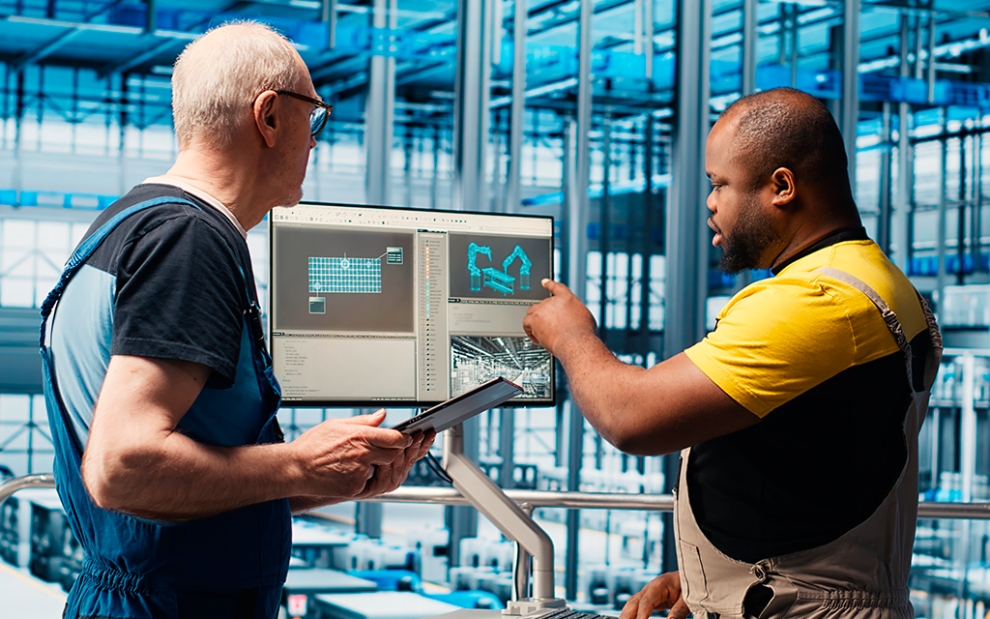The Future Skills Training Content report, developed by the Up-Skill project, offers a rethinking of how skills are defined, developed, and applied in the context of Industry 5.0. Far from being static inventories, skills are reinterpreted as emergent, context-specific capabilities that evolve through continuous interaction between workers, technologies, and organisational structures.

At its core, the report challenges traditional top-down models of skills mapping. Instead, it proposes a dynamic, participatory, and human-centric framework—one that reflects the lived realities of modern work environments, especially in small and medium-sized enterprises (SMEs) and artisanal firms. By recognising that skills emerge through experience, experimentation, and problem-solving, the report offers an adaptive approach better suited to the complexities of today's socio-technical landscapes.
Aligning with Industry 5.0: A Human-Centric Vision
The report is firmly rooted in the principles of Industry 5.0, which emphasises resilience, sustainability, and—above all—human-centricity. It advocates for skill development strategies that promote worker autonomy, uphold human dignity, and foster adaptability in the face of technological change. This shift reflects a broader movement towards value-driven industrial innovation, where technologies are deployed to enhance, rather than displace, human capabilities.

Reimagining Management: From Control to Facilitation
One of the report’s central insights is the evolving role of management. Traditional, control-oriented leadership models are increasingly inadequate in the context of rapid technological innovation. Instead, managers are called upon to become facilitators of learning—actively supporting employees in acquiring new skills, navigating emerging tools, and cultivating tacit expertise. This shift involves deeper engagement with the shopfloor, validating experiential knowledge, and nurturing a workplace culture of reflection and experimentation.
The Rise of Hybrid Roles
The digitalisation of manufacturing is giving rise to hybrid roles that blend manual craftsmanship with digital fluency. These roles challenge conventional job descriptions and demand multi-layered competencies. Examples include machinists who now manage 3D printing systems or artisans using digital tablets alongside traditional tools. Such transformations underscore the need for flexible, responsive skills frameworks that accommodate the fluid boundaries of emerging roles.

Technology Implementation: Balancing Efficiency with Expertise
The report addresses both the potential and the pitfalls of new technologies such as Manufacturing Execution Systems (MES) and collaborative robots (cobots). While these tools can streamline processes and enhance productivity, they may also constrain worker autonomy or devalue tacit knowledge. A balanced approach is essential—one that integrates digital innovation while safeguarding embodied skills and ensuring human contributions remain visible and valued.
Participatory Governance of Skills
Effective skills development in Industry 5.0 cannot be achieved in isolation. The report calls for participatory governance, involving a broad ecosystem of stakeholders—workers, managers, unions, educators, policymakers, and technology providers. Such inclusivity ensures that skills initiatives reflect real-world contexts and uphold values such as equity, inclusion, and regional relevance.
Valuing Tacit Knowledge and Embodied Expertise
A key argument in the report is the critical importance of tacit, sensory, and manual skills in production environments. These forms of expertise, often developed over decades and passed down informally, remain foundational to quality and innovation. As technologies evolve, it is vital to preserve this embodied knowledge and integrate it meaningfully into new workflows.
A Co-Creative Workflow for Skills Development
To guide organisations through this transformation, the report outlines a four-step co-creative workflow:
- Understanding the shopfloor – Observing real work conditions and practices
- Collective sensemaking – Engaging stakeholders in interpreting and framing skill needs
- Designing learning trajectories – Creating training pathways grounded in context
- Sustaining human-centred integration – Embedding new skills into adaptive systems
This approach enables firms to tailor skill strategies to their specific needs while remaining responsive to change.
Ethical Dimensions and Organisational Transformation
The report also emphasises the ethical implications of skills governance. Transparent data practices, fair attribution of knowledge, and informed consent must underpin the codification of craft expertise and digital transformation. Ultimately, implementing these recommendations requires organisational change—moving from hierarchical control to participatory leadership, investing in cross-functional collaboration, and cultivating environments that support adaptive skill formation.
Conclusion: A Roadmap for Inclusive, Resilient Industry
The Future Skills Training Content report offers more than a training strategy—it is a forward-looking roadmap for navigating the complexities of technological transformation without losing sight of human expertise. By embracing a participatory, ethical, and context-sensitive approach, organisations can build more inclusive, adaptive, and sustainable futures aligned with the core values of Industry 5.0.